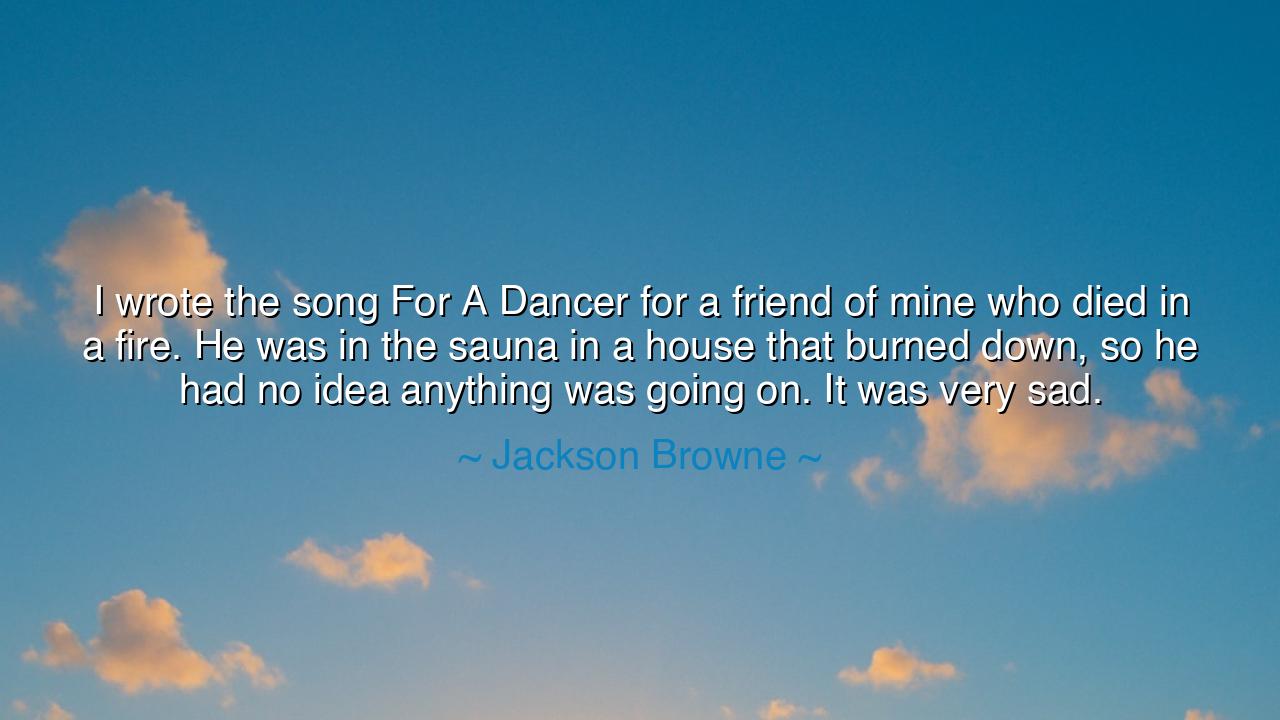
I wrote the song For A Dancer for a friend of mine who died in a
I wrote the song For A Dancer for a friend of mine who died in a fire. He was in the sauna in a house that burned down, so he had no idea anything was going on. It was very sad.






When Jackson Browne said, “I wrote the song ‘For A Dancer’ for a friend of mine who died in a fire. He was in the sauna in a house that burned down, so he had no idea anything was going on. It was very sad,” he spoke from the sacred place where grief and art meet. His words are not only a reflection of sorrow but also a testament to the power of creation born from loss. In the ashes of tragedy, he crafted a song—a vessel through which pain could travel, transform, and ultimately heal. His friend’s death, so quiet and unsuspecting, became the seed of something eternal: music that could teach others how to live, love, and remember.
To write for the dead is one of humanity’s oldest acts of devotion. From the epics carved into stone to the hymns whispered beside the graves of kings, the living have always sought to preserve the spirit of those who have departed. Jackson Browne’s “For A Dancer” is not merely a song—it is a ritual of remembrance. It transforms grief into melody, and loss into wisdom. Through this act, he fulfills the ancient truth that the artist is both mourner and healer, a bridge between what is gone and what endures. His friend’s death in the stillness of the fire becomes, paradoxically, a spark that kindled deeper understanding of life itself.
There is profound symbolism in the way his friend “had no idea anything was going on.” Death came quietly, like sleep, like the soft extinguishing of a flame unaware of its own fading. This image, though sorrowful, reminds us that not all endings come with struggle—some come with peace. The ancients often spoke of such deaths as gifts from the gods, for they spared the soul from terror. Yet for those left behind, such peace becomes a double-edged blessing—it comforts even as it wounds. Browne’s sadness is not only for the death itself, but for the sudden silence left in its wake—the absence of a voice that once laughed, moved, danced.
Throughout history, great artists have woven sorrow into song as a way to honor the dead and to understand the meaning of their own survival. The poet W.H. Auden, upon the death of his friend, wrote “Stop all the clocks,” a cry of grief that has echoed for generations. The composer Mozart, near his own death, wrote his Requiem, as though composing both a farewell and a promise. So too did Jackson Browne, though his offering was born from friendship rather than fame, create a song that spoke not just to one man’s death, but to the universal truth that love transcends the grave.
The meaning of Browne’s words lies in the transformation of mourning into music, of despair into understanding. He did not allow the fire to consume only his friend—it also ignited the flame of creation within him. In the act of writing, he gave shape to the formless ache of loss. He showed that art is not an escape from grief but a sacred conversation with it. Through his song, his friend dances still, unseen but not forgotten, his life turned into rhythm, his passing into poetry.
In the ancient sense, to write or sing of the dead is an act of resurrection. The Egyptians believed that to speak a name aloud was to keep the soul alive in the afterlife. The Greeks built temples to heroes, so their deeds would echo through eternity. In this way, “For A Dancer” becomes not just a song, but a small temple of remembrance—built not of stone, but of notes, words, and feeling. Every time it is sung, the friend lives again, if only for a moment, in the hearts of those who listen.
And so, the lesson of this quote is both tender and eternal: turn your sorrow into creation. When tragedy strikes—and it will—do not hide from it. Sit with it. Listen to what it teaches. Then, like Jackson Browne, give it form. Write, sing, paint, or pray. For the greatest tribute we can offer to the dead is not silence, but continuation—the decision to let love endure in a new shape.
Let those who hear these words remember: every life, no matter how briefly it burns, leaves behind light. To honor that light is to become, as Browne did, a keeper of memory—a singer for the dancers who have left the floor, ensuring that though their steps have ceased, their music never truly ends.






AAdministratorAdministrator
Welcome, honored guests. Please leave a comment, we will respond soon